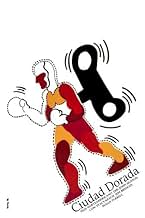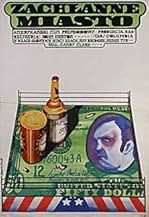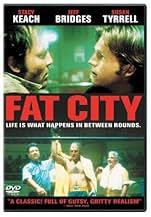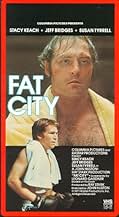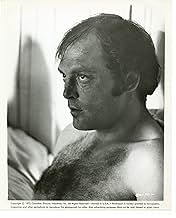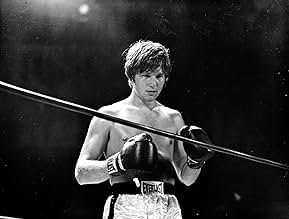AVALIAÇÃO DA IMDb
7,2/10
11 mil
SUA AVALIAÇÃO
Dois homens, que trabalham como boxeadores profissionais, são afetados quando suas carreiras começam a tomar um impulso oposto.Dois homens, que trabalham como boxeadores profissionais, são afetados quando suas carreiras começam a tomar um impulso oposto.Dois homens, que trabalham como boxeadores profissionais, são afetados quando suas carreiras começam a tomar um impulso oposto.
- Indicado a 1 Oscar
- 4 vitórias e 4 indicações no total
Álvaro López
- Rosales
- (não creditado)
Carl D. Parker
- Paymaster
- (não creditado)
Bill Riddle
- Boxer
- (não creditado)
Al Silvani
- Referee at Tully-Lucero Fight
- (não creditado)
Avaliações em destaque
Huston always had an eye for characters. His movies almost all dealt with the concerns of lower middle class working joes, the "regular fellows" with whom Huston somehow identified in the romantic Hemingwayesque lantern jawed "a man's gotta do what a man's gotta do" tradition. But his characters were more than mere macho he-men. They displayed genuine and uncommonly powerful vulnerabilities, hopes and dreams, flaws and finally cynicism. After an incredible first 20-plus creative years, Huston floundered for almost a decade with commercial and artistic disappointments (FREUD, THE BIBLE, THE KREMLIN LETTER, SINFUL DAVEY among them) before coming back to his wheelhouse with the carefully subdued yet deeply affecting character study FAT CITY.
FAT CITY is a grand return to form for Huston precisely because it is so indelibly imbued with real life in the form of its unforgettably true characters. None of these people are particularly remarkable individuals (frankly they are mostly below average in self-awareness, skills and intelligence), yet because Huston is so skillful at revealing character through the carefully structured unfolding (and gradual unhinging) of Keach's character, we are given insights which Keach (and Bridges and Candy Clark and the wonderful Nicholas Colasanto) can't make for themselves because they are too close to their own situations. Bridges has a nice interlude and Colasanto is so good in his limited Burgess Meredith Mickeyesque role, but the heart of this movie is Stacy Keach, who rises to the occasion with uncommon subtlety and power. It is a rare movie that can document losers in their daily lives without editorializing or sermonizing. FAT CITY takes an unflinching glance at these people and shows us things which seem prosaic on the surface but which upon examination hide deeper meaning (and heartbreak).
There are no pyrotechnics, no real twists, no witty or stand out dialogue exchanges, not much going on with the camera (though Hall's coloring is as always very well chosen), and very little budget on display in FAT CITY. It appears Huston shot pretty much everything on location in the flophouses around Stockton, CA. Yet the performances are uniformly outstanding and we come to care about these losers as they fumpher through life kidding themselves about where they've been, where they are and where they are going. I can't think of a movie where less actually happens to the characters (maybe BARFLY) but where I still find myself so deeply involved. Whenever I see it playing on the tube I generally stay with it all the way. There are very few movies in that league for me.
Warning: do NOT go in expecting crowd-pleasing Rocky-esque boxing sequences. This is less the story of a Rocky and more the story of a Spider Rico (the "ham n' egger" Rocky beats up in his first fight and from whom we never hear again.) The movie disguises itself as a Horato Alger-like comeback or underdog story initially, but it is ultimately one of the bleakest, realest character studies you're ever likely to see. One of the best Huston movies to come after the 1960s and a downbeat classic. 9/10.
FAT CITY is a grand return to form for Huston precisely because it is so indelibly imbued with real life in the form of its unforgettably true characters. None of these people are particularly remarkable individuals (frankly they are mostly below average in self-awareness, skills and intelligence), yet because Huston is so skillful at revealing character through the carefully structured unfolding (and gradual unhinging) of Keach's character, we are given insights which Keach (and Bridges and Candy Clark and the wonderful Nicholas Colasanto) can't make for themselves because they are too close to their own situations. Bridges has a nice interlude and Colasanto is so good in his limited Burgess Meredith Mickeyesque role, but the heart of this movie is Stacy Keach, who rises to the occasion with uncommon subtlety and power. It is a rare movie that can document losers in their daily lives without editorializing or sermonizing. FAT CITY takes an unflinching glance at these people and shows us things which seem prosaic on the surface but which upon examination hide deeper meaning (and heartbreak).
There are no pyrotechnics, no real twists, no witty or stand out dialogue exchanges, not much going on with the camera (though Hall's coloring is as always very well chosen), and very little budget on display in FAT CITY. It appears Huston shot pretty much everything on location in the flophouses around Stockton, CA. Yet the performances are uniformly outstanding and we come to care about these losers as they fumpher through life kidding themselves about where they've been, where they are and where they are going. I can't think of a movie where less actually happens to the characters (maybe BARFLY) but where I still find myself so deeply involved. Whenever I see it playing on the tube I generally stay with it all the way. There are very few movies in that league for me.
Warning: do NOT go in expecting crowd-pleasing Rocky-esque boxing sequences. This is less the story of a Rocky and more the story of a Spider Rico (the "ham n' egger" Rocky beats up in his first fight and from whom we never hear again.) The movie disguises itself as a Horato Alger-like comeback or underdog story initially, but it is ultimately one of the bleakest, realest character studies you're ever likely to see. One of the best Huston movies to come after the 1960s and a downbeat classic. 9/10.
The 1970s produced some of the greatest American movies of all time, that's indisputable. But while everyone focuses on (the admittedly very good) more famous works by Scorsese and Coppola, many equally worthwhile movies get little attention - 'Bring Me The Head Of Alfredo Garcia', 'Scarecrow', 'Fingers', 'Tracks', 'The Panic In Needle Park', 'Blue Collar', and this one, arguably John Huston's most underrated film. The four leads Stacey Keach ('The Ninth Configuration'), Jeff Bridges ('The Last Picture Show'), Susan Tyrrell ('The Killer Inside Me'), and Candy Clark ('American Graffiti') are all outstanding, and in Keach's case it's possibly his finest performance to date. What an underrated actor Keach is! This is a powerful and haunting look at the underbelly of American working class life, a subject very rarely dealt with honestly in contemporary Hollywood films. 'Fat City' doesn't deserve its obscurity. It is a small masterpiece. Highly recommended to people who value downbeat and realist dramas more than dumbed down popcorn "entertainment".
John Huston is amazing to me. He defined an entire genre with his foot barely in the Hollywood door, then he kicked the door down and walked in to clear well deserved Oscars as both writer and director, he took his Oscars with him to Africa to get hammered with Erol Flynn and go out on safaris leaving behind him a big production to go to hell, then came back to find they had nailed a new door in place of the one he had torn down so he didn't bother to knock at all this time, he packed his things and went to a small dingy bar where Mexicans and barflies go to kill their time to make movies about killing time, movies about misfits and people who are dead inside, movies like Fat City and Under the Volcano, to adapt Flannery O'Connor and James Joyce, to soar above and beyond what anyone might have expected from any director of his generation. It's 1972 and John Huston is still relevant as ever. How many directors can you name who turned out some of their best material in their fifth decade directing movies? Venerable relics like Clint Eastwood move over, American cinema (not simply Hollywood) already had a patriarch in place long before any of you looked through a viewfinder.
It's also amazing to me how an indomitable absolute badass of a successful director can know failure so well. This is a movie where people box but it's not about boxing. There's no triumph to be had here and the crowd gathered in the small suburban boxing hall in Stockton, California, to pass their time is not there to be pleased. Most of them are probably the same kind of deadbeat with no future and a sh-tty job as the third-grade boxers who beat each other for their amusement. We get the young upstart boxer with the fast legs and a bright future ahead of him if only someone could train him right but this character can only make sense when we see him standing next to Stacy Keach, the aging boxer who won't see thirty again and who maybe had a chance once but blew it for women and alcohol and now he's desperate for one last throw of the dice.
The sad beauty of Fat City is that we're not looking at some kind of last defiant stand, we don't enter the ring for one last moment of triumph with the lights blaring bright and the crowd cheering, this is not The Wrestler anymore than it is Rocky, the lights were not only dimmed long ago but they probably never shone bright enough anywhere except in the protagonist's head. The closest Stacy Keach came to glory some odd 10 years ago was in itself a failure. Were his eyebrows slashed with a razor or not that fateful night down in Mexico we never find out. For most of its duration Fat City is a beaten man with sunken cheeks and a grim unshaven wan face wearing an expression of incredulous outrage.
Then we're inside a rundown cafe, the walls are painted in sickly washed-out colors and old men play cards around tables in felt, and we sit down for one last cup of coffee on the cheap formica counter. We see the young boxer standing next to the washed-up has-been one who can't even be a mentor anymore and an old man, a walking shell of someone "who was maybe young once", comes over to serve us and it all makes sense. "Maybe he's happy" says the young one. "Maybe we all are" says the other, and we know we're not, life doesn't quite work out that way, but it's all we have. The old man turns and smiles a toothless smile (senile or knowing, who's to say) and Fat City fades out into one of the most touching heartfelt endings I've seen. Fatalists cannot afford to miss this one, it's the stuff dashed hopes and broken lives are made of. Rejoice.
It's also amazing to me how an indomitable absolute badass of a successful director can know failure so well. This is a movie where people box but it's not about boxing. There's no triumph to be had here and the crowd gathered in the small suburban boxing hall in Stockton, California, to pass their time is not there to be pleased. Most of them are probably the same kind of deadbeat with no future and a sh-tty job as the third-grade boxers who beat each other for their amusement. We get the young upstart boxer with the fast legs and a bright future ahead of him if only someone could train him right but this character can only make sense when we see him standing next to Stacy Keach, the aging boxer who won't see thirty again and who maybe had a chance once but blew it for women and alcohol and now he's desperate for one last throw of the dice.
The sad beauty of Fat City is that we're not looking at some kind of last defiant stand, we don't enter the ring for one last moment of triumph with the lights blaring bright and the crowd cheering, this is not The Wrestler anymore than it is Rocky, the lights were not only dimmed long ago but they probably never shone bright enough anywhere except in the protagonist's head. The closest Stacy Keach came to glory some odd 10 years ago was in itself a failure. Were his eyebrows slashed with a razor or not that fateful night down in Mexico we never find out. For most of its duration Fat City is a beaten man with sunken cheeks and a grim unshaven wan face wearing an expression of incredulous outrage.
Then we're inside a rundown cafe, the walls are painted in sickly washed-out colors and old men play cards around tables in felt, and we sit down for one last cup of coffee on the cheap formica counter. We see the young boxer standing next to the washed-up has-been one who can't even be a mentor anymore and an old man, a walking shell of someone "who was maybe young once", comes over to serve us and it all makes sense. "Maybe he's happy" says the young one. "Maybe we all are" says the other, and we know we're not, life doesn't quite work out that way, but it's all we have. The old man turns and smiles a toothless smile (senile or knowing, who's to say) and Fat City fades out into one of the most touching heartfelt endings I've seen. Fatalists cannot afford to miss this one, it's the stuff dashed hopes and broken lives are made of. Rejoice.
I had deliberately overlooked Fat City in the past believing it to be yet another twist on the formulaic and Hollywoodization of boxing stories. Was I wrong! I'm so glad that I unexpectedly caught this and was riveted from the get go. Fat City is an amazing film, made even more stellar by the casting of Stacy Keach, Jeff Bridges, Candy Clark and Nick Colasanto. It is hard to distinguish between these marvelous actors as their performances, under the hands of the maestro John Huston, are incredible. Stacy Keach is the focus however, and he carries the film with the able performances of the aforementioned. I believe this to be one of the most overlooked films of all time.
The characters are a bunch of losers, but they don't know they're losers and keep reiterating their dreams. They operate on a level that is below average and live in impoverished surroundings, always believing that something good is around the corner. There is no big win in this, the wins remain around the corner.
There's basically no beginning, middle and end. It is a study of the underbelly of a town in California, the seedy bars, the dirty restaurants, life in the one room with kitchen-in-a-corner of a walk-up fleabag hotel. Stacy Keach pulls you into this world, he lives and breathes the character he plays down to the last few minutes of screen time when he takes a look around the rathole of a restaurant he's in, surrounded by people like himself and the film freezes for about a minute before it moves on.
You catch his stark awareness at that moment. And all of his life, past, present and future becomes crystal clear to him. You don't think he's going to do much with this newfound insight. It doesn't matter. And that's the point. Bleak and beautiful. All in the same minute of time. 9 out of 10. Thanks once again, Mr. Huston.
The characters are a bunch of losers, but they don't know they're losers and keep reiterating their dreams. They operate on a level that is below average and live in impoverished surroundings, always believing that something good is around the corner. There is no big win in this, the wins remain around the corner.
There's basically no beginning, middle and end. It is a study of the underbelly of a town in California, the seedy bars, the dirty restaurants, life in the one room with kitchen-in-a-corner of a walk-up fleabag hotel. Stacy Keach pulls you into this world, he lives and breathes the character he plays down to the last few minutes of screen time when he takes a look around the rathole of a restaurant he's in, surrounded by people like himself and the film freezes for about a minute before it moves on.
You catch his stark awareness at that moment. And all of his life, past, present and future becomes crystal clear to him. You don't think he's going to do much with this newfound insight. It doesn't matter. And that's the point. Bleak and beautiful. All in the same minute of time. 9 out of 10. Thanks once again, Mr. Huston.
American audiences don't generally go in for realistic stories of human despair and suffering that offer very little in the way of hope or relief. This may explain why John Huston's Fat City has been condemned to obscurity, a real shame considering what a great flick it is. It's the sort of movie you see and remember but can't quite pick it out of a line-up... a shuffling, mumbling story of down-and-out pugs in an off-the-map burgh. You're taunted with the possibilities of the story picking up to... well if not epic at least noteworthy proportions... but, all of the characters' minor victories are mitigated by their simultaneous defeats. Keach's Tully is the main thrust of the story, though it tends to veer off on the occasional tangent. A has-been who possibly never really was, crushed by the departure of his wife and overwhelmed by the constant little defeats in his life. Huston really drives this point home, that all of these little defeats add up. Without giving too much away, suffice to say Fat City is a film where mood overshadows plot. The mood is indelibly rendered by Conrad Hall's dark, dirty images, which nearly swallow the characters in the depth of their shadows. Watching it back to back with fellow pugilist opus Raging Bull (1980), it's easy to see that Huston was a keen observer of human behaviour, while Scorsese was a keen observer of Hollywood films of the thirties. And don't even talk about Rocky. I would compare it favourably with Barbet Schroeder's Barfly (1987), another film about fringe life in California, and even Vincent Gallo's excellent Buffalo '66 (1998), though of the three it is the bleakest and the least accessible.
Você sabia?
- CuriosidadesAccording to Stacy Keach, Sixto Rodriguez knocked him out during their fight scene and that shot appears in the film.
- Erros de gravaçãoDuring the bar scene, the barrette in Susan Tyrrell's hair moves all over the place from shot to shot.
- ConexõesFeatured in Moviedrome: Fat City (1988)
- Trilhas sonorasHelp Me Make It Through the Night
Composed by Kris Kristofferson
Performed by Kris Kristofferson
© 1970 Combine Music Corporation
[Played over opening credits]
Principais escolhas
Faça login para avaliar e ver a lista de recomendações personalizadas
- How long is Fat City?Fornecido pela Alexa
Detalhes
Contribua para esta página
Sugerir uma alteração ou adicionar conteúdo ausente


